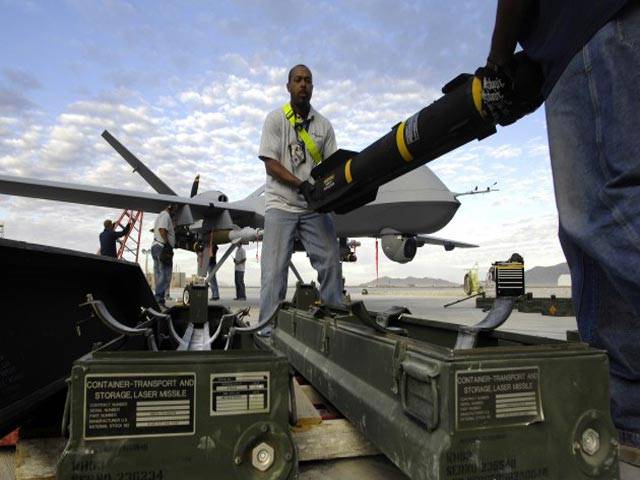Expressing both public and private frustration with Pakistan, the Obama administration has unleashed the CIA to resume an aggressive campaign of drone strikes in Pakistani territory over the last few weeks, approving strikes that might have been vetoed in the past for fear of angering Islamabad.
Now, said a senior U.S. official, speaking on condition of anonymity in discussing sensitive issues, the administration's attitude is, "What do we have to lose?"
Defense Secretary Leon E. Panetta made clear the deteriorating relations with Islamabad on Thursday, saying the United States is "reaching the limits of our patience" because Pakistan has not cracked down on local insurgents who carry out deadly attacks on U.S. troops and others in neighboring Afghanistan.
The CIA has launched eight Predator drone attacks since Pakistan's president, Asif Ali Zardari, was invited to attend the May 20-21 NATO summit in Chicago but refused to make a deal to reopen crucial routes used to supply U.S. troops in Afghanistan, as the White House had hoped.
The CIA had logged 14 remotely piloted strikes on targets in Pakistan's rugged tribal belt in the previous 5 1/2 months, according to the New America Foundation, a U.S. think tank that tracks reported attacks.
"Obviously, something changed after Chicago," said a senior congressional aide in Washington, speaking on condition of anonymity in discussing a classified program. "I am only getting the official story, but even within the official story there is an acknowledgment that something has changed."
Another congressional official said the surge in drone attacks stemmed in part from success in tracking down militants on the CIA's target list, although only one has been publicly identified. It's unclear who else has been targeted.
Pakistanis view the drone strikes as an attempt to intimidate their civilian and military leaders into giving in to U.S. demands. If that's the strategy, it won't work, said experts and analysts in Islamabad, the Pakistani capital.
"They are trying to send a message: 'If you don't come around, we will continue with our plan, the way we want to do it,' " said Javed Ashraf Qazi, a retired Pakistani intelligence chief and former senator. It's "superpower arrogance being shown to a smaller state. But this will only increase the feeling among Pakistanis that the Americans are bent on having their way through force and not negotiation."
A White House official said no political or foreign policy considerations would have prevented the CIA from taking action when it found Abu Yahya al Libi, Al Qaeda's No. 2 leader, who was killed by a drone-fired missile in Pakistan on Monday.
Pakistan blocked truck convoys hauling North Atlantic Treaty Organization war supplies from the port city of Karachi after a clash near the Afghan border in November led to errors and US military helicopters accidentally killed two dozen Pakistani soldiers.
The U.S. initially halted all drone strikes for two months to ease Pakistani sensitivities, and the attacks resumed only sporadically after mid-January. By May, Pakistani officials were signaling a willingness to reopen the supply route to resurrect relations.
But talks deadlocked over Pakistan's demands for sharply higher transit fees just before the NATO conference, and President Obama appeared to give Zardari a cold shoulder in Chicago. Pentagon officials will visit Islamabad this week for a new round of talks.
U.S. officials say Haqqani fighters, including some wearing suicide vests, most recently were involved in an assault last week on Forward Operating Base Salerno, a U.S. base in southeastern Afghanistan. U.S. troops killed 14 insurgents and suffered no casualties, officials said.
"The tensions with Pakistan are clearly going up, not down," said the second congressional official. "The fact that Panetta was talking about Pakistan in India tells you how frustrated people are."
"If the U.S. feels it is doing very well in the war against Al Qaeda, OK," said Riaz Khokhar, a former Pakistani foreign secretary. "But people in Pakistan don't know who Al Libi is and don't care who he is. What people care about is that Pakistani sovereignty is being violated repeatedly by drones."
Despite the intensity of anti-American sentiment in Pakistan, the U.S. has steadfastly defended the drone strikes as a vital tool against Al Qaeda and other militant organizations. Aside from Al Libi, CIA drone strikes have killed five senior Al Qaeda leaders in the last year.
Friday, April 19, 2024
CIA gets nod to step up drone strikes in Pakistan

9:07 PM | April 18, 2024
King Charles's cancer ‘eating him alive,' monarch unable to perform duties: Insider
1:02 AM | April 19, 2024
Mehwish Hayat says she would like to work with Aamir Khan
9:59 PM | April 18, 2024
What caused record-breaking rainfall in UAE?
9:58 PM | April 18, 2024
Donald Trump discusses Ukraine, Middle East, NATO with Polish President Duda
9:57 PM | April 18, 2024
'That'll be awesome,' Rohit Sharma on idea of Pakistan vs India Test series
9:17 PM | April 18, 2024
Hepatitis Challenge
April 18, 2024
IMF Predictions
April 18, 2024
Wheat War
April 18, 2024
Rail Revival
April 17, 2024
Addressing Climate Change
April 17, 2024
Justice denied
April 18, 2024
AI dilemmas unveiled
April 18, 2024
Tax tangle
April 18, 2024
Workforce inequality
April 17, 2024
New partnerships
April 17, 2024
ePaper - Nawaiwaqt
Advertisement
Nawaiwaqt Group | Copyright © 2024





